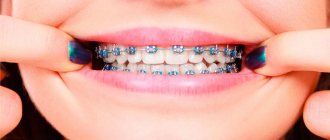Chewing or grinding of teeth in a child
Chewing or smacking in sleep is an uncontrolled contraction of the oral masticatory muscles, accompanied by a sharp clenching of the jaws, grinding of teeth, smacking, excessive salivation, creaking and other symptoms. In medicine, this problem is called “bruxism.”
The period of time during which a person chews can range from a few seconds to 5-10 minutes. Typically, during the entire sleep phase, several episodes of pathology can be noticed. If one episode lasts more than 15 seconds, cracks and chips in the teeth and soft tissue injuries may occur.
Experts have linked a variety of slurping sounds, chewing, and teeth grinding to other sleep disorders. They accompany somnambulism, snoring, urinary incontinence at night, and the occurrence of nightmares. The popular version attributes the symptoms of bruxism to infection with worms. However, in reality, night sounds of teeth and the presence of parasites in the body are in no way connected.
Most often, manifestations of bruxism, when a person periodically swallows saliva, grinds teeth, smacks or chews, are associated with psycho-emotional disorders, for example, depression, stress, mental overload. Excessively active activities before bedtime, overexcitation, growing internal anxiety, and general tension provoke restless sleep.
If the episodes last no more than 10 seconds and occur 1-2 times per night, then this may not indicate any disease, but simply be an individual feature.
This is especially true for young children, who are often subject to reflexes, and chewing at night is a kind of continuation of the sucking instinct or may indicate the child’s hunger.
How long should a baby sleep?
The importance of sleep for babies is difficult to overestimate.
Quality rest, as well as good nutrition, is the key to normal physical and psycho-emotional health of children. During sleep:
- the hormone somatotropin is produced, which plays an important role in the formation of the skeleton;
- Immunity is restored. After falling asleep, T-lymphocytes are activated, destroying viruses and bacteria;
- metabolism in tissues increases;
- cells are renewed;
- the nervous system relaxes.
Babies spend most of their time sleeping during the first three months of life. According to WHO recommendations, the total sleep duration of babies from 0 to 3 months should be 14–17 hours a day. However, these indicators are approximate, because each child is individual. Therefore, if your baby sleeps more or less than the established norm, but still feels good, then there is no need to worry.
Reasons for chewing in your sleep
A person chews in his sleep for several reasons:
- Features of the psyche of young children. Children handle emotional stress and stress differently. Even some positive emotions, but excessive ones, can manifest themselves as nighttime symptoms of bruxism. In this case, the child should be shown to a neurologist to exclude possible pathologies of the central nervous system.
- Teething or changing milk teeth to molars . This process is often accompanied by discomfort, pain, and itching. A sleeping baby literally wants to scratch his gums, but does not control himself in his sleep, so he chews or grinds his teeth.
- Various orthodontic pathologies - malocclusion, diseases of the jaw joints, abnormal structure - can lead to the fact that the baby seems to chew food not only in his sleep, but also during daylight hours.
- Another reason why people suffer from bruxism is heredity . The risk of its manifestation in children increases if a similar pathology is observed in one of the parents.
- Nightmarish dreams. Too much stress during a night's rest can cause unconscious movements of various muscles, which is manifested not only by grinding, but also by moving the tongue in sleep, twitching of the arms and legs, blinking, and tics.
- Nasal congestion , enlarged adenoids and other disturbances in normal breathing cause anxiety and overly active work of the facial muscles.
- Manifestations of bruxism are accompanied by a deficiency of magnesium, calcium, amino acids and B vitamins, which affect the functioning of the central nervous system and muscles.
- Insufficient development of jaw muscles . A newborn baby must be fed only with milk or formula, and from 6 months it is necessary to introduce complementary foods, constantly changing the structure of dishes. If a child primarily eats pureed or blended food, the jaw muscles do not work. If there is no load, grinding or chewing may occur during sleep.
In the presence of helminths, it is indeed possible that such a symptom may occur, but it is not caused by the presence of parasites as such, but by general discomfort in the body, intoxication, which makes sleep restless and intermittent.
How to avoid the disorder - prevention of bruxism in children
Remember that most often, involuntary closing of the jaws during sleep is observed against the background of stressful situations. Try to ensure that the baby grows up in a comfortable psychological and emotional environment.
In cases where stress could not be avoided (this could be entering kindergarten, forced separation from one of the parents, the death of a grandmother or grandfather), try to mitigate its consequences as much as possible. Be especially attentive and tolerant of your child during such periods.
To prevent nighttime bruxism, make sure your child is calm before bedtime. Instead of watching cartoons or a computer game, invite him to read, or do puzzles or mosaics. Stop active games at least an hour before bedtime. Try to spend at least half an hour before bed with your child, this will allow him to relax and fall asleep peacefully. Quiet walks in the fresh air are also very useful in the evening. They not only help create a favorable emotional background, but also contribute to the health of the body as a whole.
Monitor your child's nutrition. Try to keep his food healthy and varied. Be sure to keep your jaws busy by letting your baby chew on hard vegetables and fruits. This kind of “charging” is especially useful an hour before going to bed, just don’t forget that after it the child should brush his teeth. Select the brush and toothpaste according to the baby’s age. If the child is still very young, ASEPTA Baby gel toothpaste, designed specifically for delicate baby teeth, is perfect. And for those who are already 4 years old, we can recommend ASEPTA Kids toothpaste. It helps to carefully care for the oral cavity during the period of growth of baby teeth and their replacement with permanent ones, ensuring oral health.
There is no need to panic if your child begins to grind his teeth in his sleep, but carefully assess the degree of the disorder and the possible threat to the baby’s health, visiting specialists if necessary. Timely medical consultation will help avoid worsening the problem and the development of more serious ailments.
Treatment
Smacking in your sleep is not considered a pathology and does not threaten your health. Rather, this problem is not the sleeper himself, but his environment. There are several secrets that will help solve the problem of teeth movement and grinding:
- Try to organize your child’s activities in such a way that he does not experience too strong emotions, including positive ones. Protect him from stress, family quarrels, too active evening games, cartoons and computer games with a scary plot.
- If a child slurps regularly and often (more than 5-7 episodes per night), show him to specialists - a pediatrician, neurologist, somnologist. The cause of night grinding in adolescents may be vegetative-vascular disorders, which are accompanied by headaches and fluctuations in blood pressure.
- It is also necessary to exclude the viral load on the body and check for worms. If, in addition to manifestations of bruxism, the child is pale, inactive, has a disturbance in appetite and bowel movements, basic tests - urine and blood - will be required.
- Sometimes children chew because of an uncomfortable bed, scratchy bedding, stale dry air, or high temperature in the bedroom. Be sure to ventilate before going to bed, adjust the humidity to 50–70%.
- You can come up with evening rituals that will help your baby calm down faster. Swimming, listening to audio books, fairy tales, and some calm games, such as board games, are suitable.
If such symptoms are caused by a pathological condition or some disease, medications are selected only by a doctor. If a pathology is diagnosed, treatment will not be aimed at eliminating grinding or chewing, but at the root cause.
Features of sleep for babies from 0 to 3 months
Some manifestations of restless behavior in children after falling asleep can be explained by the peculiarities of the structure of their sleep.
A baby's sleep, like an adult's, consists of two phases:
- Orthodox or slow-wave sleep. During this period, the brain is inactive, the body is relaxed, breathing is even and calm. It is during slow-wave sleep that a person fully rests and restores physical strength.
- Paradoxical or REM sleep. The paradoxical phase is characterized by an increase in body temperature and pressure, rapid heartbeat, breathing, and rapid movement of the eyeballs under closed eyelids.
During sleep, both phases replace each other: first comes slow sleep, then fast sleep, and so on in a circle. The structure of sleep in infants in the first months of life is unique: its main part is REM sleep, during which the baby may grimace, twitch his arms and legs. This behavior of a baby during sleep is absolutely normal and should not bother parents. As the child grows older, the period of the orthodox phase gradually increases, and the child begins to sleep more peacefully.
Short bridle
If your baby clicks his tongue while bottle feeding or breastfeeding, this may indicate a short frenulum. This is the name given to the physiological feature when the frenulum is attached to the edge of the tongue. This causes incorrect grip, because the baby’s tongue movements are limited. For these children, it takes a little longer to get full and they begin to lose weight.
Only a highly qualified pediatric dentist can tell whether a child’s frenulum is short or long. If it is short and not elastic, the doctor suggests trimming it. This procedure is performed in a dentist's office for a short time. You do not have to go to the hospital with your child, since after the procedure you can go home straight away.
In the first days of his life, the baby sucks up to 30 ml of milk. While he eats, he learns to distribute his breathing, control the entire process, tries to swallow and suck correctly. However, all this is quite complicated and the child swallows air when feeding from a bottle, which accumulates in the ventricle and causes pain.
Kharitonov and the finger
Speaking about this story about one of his main opponents, Sergei Kharitonov, Alexander refers to his brother, but Fedor himself never confirmed it. Moreover, the finger appears in all the fights between the fighters. One day Alexander suggested that the loser of their battle should cut him off.
Kharitonov received a micro injury during training. Stands on all fours. One of the trainers says, “Now I’ll cure him.” He comes up and inserts his finger into his ass with all his might. But Kharitonov didn’t even waver. What do I want to say? Regarding Kharitonov, ask questions to Boris Moiseev. He knows better why they say this, why they behave this way ,” Emelianenko said in a video on his Instagram.
Look away
Many people think that when the interlocutor looks away, he is certainly lying. But sometimes this interruption of eye contact can be due to social, psychological and cultural differences. In some countries, looking into someone's eyes is a mere trifle, while in others, such as Arab countries, it is a rude gesture.
If you are in front of an introvert, he may also avoid eye contact simply because he is uncomfortable. Therefore, it is better to monitor the movements of the muscles around the eyes. If the person in front of you is nervous, uncomfortable or stressed, their muscles will also be tense.
Photo: open Internet sources
The baby smacks his lips when feeding. Why does a child smack his lips and should he be concerned?
It is always difficult at first for new parents to understand what their baby wants from them. As a rule, they just start trying everything in turn: changing the diaper, feeding the baby, helping him burp, putting him to bed. But if you know about simple baby signals and their meaning, it will be much easier for you to calm your baby, and he will be much less fussy. Next we will talk about how babies behave, what signals they give to us adults when they are hungry, tired or want to play.
If the child is hungry
If your baby is hungry and crying, it means that the stage when he wanted to eat and tried to tell you about it has long passed. It is much easier to feed a slightly hungry child who is still calm than one who is already fussy about it. Expect signals from a newborn that he is hungry every 1-2 hours, from a slightly older child - every 3-4 hours. Here are what these signals usually look like: Yawns, opens mouth;
Smacks lips or makes sucking noises;
Puts his fist in his mouth;
Moves eyes quickly in sleep;
Most babies use the same signals, so once you know what to look for, you'll know when your baby is telling you he's hungry.
If the child is tired and wants to sleep
It's easy to tell when your baby is tired and sleepy at first because babies typically eat and then fall asleep. However, as children get older, they may stay awake longer, making it harder to determine whether they are sleepy. Some babies follow a schedule and sleep at almost the same time every day. Others don’t, and then mom and dad must understand when the child gets tired. You can do this by the following signs: Rubbing your eyes or yawning;
Ignores your attempts to distract him.
It is important that when your baby starts to show signs that he is tired and wants to sleep, you react quickly, as an overtired baby will be much more difficult to put to sleep.
If the child wants to play
Believe it or not, there will be times when your baby will need nothing more than your attention. By paying attention to your child from a very early age, you will help him quickly learn how to behave correctly in adulthood - in a word, make the upbringing process easier for yourself. Here are some signals that may indicate that a child wants to play: Freezes when looked at;
Looks carefully at your face, looks into your eyes;
Opens his eyes wide and carefully follows your movements;
Give your child attention by getting down to his level and playing with toys or reading a book. If you are currently busy with something (for example, preparing dinner), give your baby attention by telling him what you are doing or responding to how he plays or what he does.
All parents want to provide their baby with the best. In the online store parado.com.ua you can buy high-quality and incredibly beautiful clothes for your child. There is literally everything here: from tiny socks to
New sounds that a baby makes are always a reason for joy for every mother. But if the baby clicks during feeding, this may indicate frenulum defects and improper attachment to the breast. This behavior of the baby alarms many women, especially if he behaves restlessly at this time.











